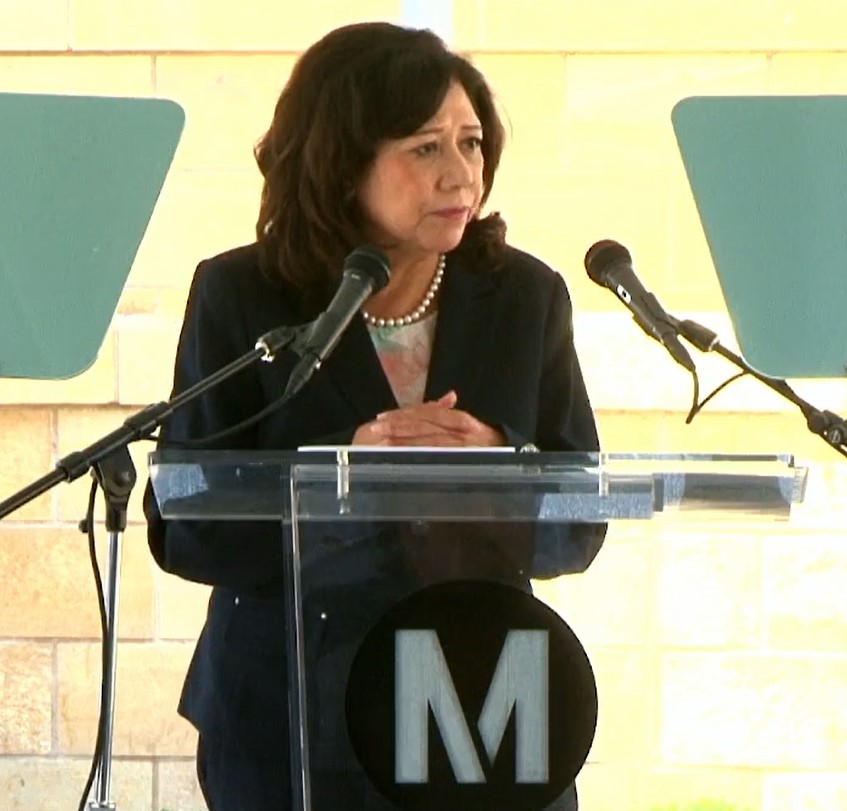Yesterday, at the 2021 Metro State of the Agency event, new CEO Stephanie Wiggins and incoming Board Chair Hilda Solis spoke on their priorities for Metro. Watch the full event on Facebook live. Several speakers noted that with Solis and Wiggins at the helm, this is the first time that Metro has been led by two women - and by two women of color.
Incoming chair Solis stressed three top priorities: better transit service, transportation spending supporting vulnerable communities, and reimagining highway investment.
Solis pledged transit service improvements "especially for buses that primarily serve low-income riders." Solis' goal of "faster, more frequent, and more reliable" transit includes Metro restoring pre-COVID service levels by September "and we won't stop there." Within better transit, she included more affordable housing next to high quality transit - as part of Metro's major capital projects "sooner - instead of as an afterthought."
Solis' transportation spending agenda includes job training, apprenticeships, local hire, engaging more women in the trades, and support for small businesses - including street vendors.
In regards to reimagining Metro highway building, Solis began by stressing the harmful disparities in past Southern California's freeway construction - including the "tangle of freeways" that "plow through" Boyle Heights and East Los Angeles. Solis notes that those freeways displaced thousands of residents, divided neighborhoods, and concentrated pollution for the communities of color that remained. And beyond her district, Solis noted the "over 25,000 residents displaced" for the construction of the 105 Freeway.
Solis praised the Metro board's recent approval of highway project funding flexibility to support "all users of the road... everyone - whether you bike, walk, roll, you take transit, or you drive." She touched on the recent controversies over Metro's now-suspended plan to widen the lower 710 Freeway, saying, "communities along corridors like the 710 South should not be burdened with displacement and pollution even more than they already have been." Solis further pledged to "reevaluate Metro's investments in highway programs to protect communities from displacement and environmental pollution."
Wiggins spoke broadly on many initiatives that Metro is undertaking to support pandemic recovery with a focus on equity - on serving communities most heavily impacted by the pandemic and by historic under-investment.
Here are a few of the upcoming Metro initiatives Wiggins touched on:
- The agency will convene a new Metro Youth Council intended to better include voices of the "riders of the future."
- This fiscal year, Metro will release its first ever Gender Action Plan. The plan will build from findings and recommendations in Metro's 2019 Understanding How Women Travel report.
- Metro will soon issue a five-year financial sustainability plan to "tighten belts" and "look for efficiencies."
- Metro will keep implementing its NextGen Bus Study to make buses "faster, cleaner and safer" - including seeing "more of these improvements" like the recently-half-opened Alvarado peak-hour bus lanes.
- Improving Metro's response to the unhoused people using its system: "We will pursue new and more effective ways of addressing homelessness. We will no longer rely on law enforcement as a primary way of dealing with the unhoused. We will address unhoused people on our system with compassion and dignity. We will collaborate with our city and community partners and social services."
Overall, Wiggins pledged to make Metro transit both the first choice for Angelenos -"normal and expected... just what people do" - and a "world class transit experience" for people visiting L.A. for the 2028 Olympics.






